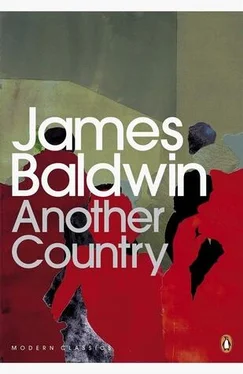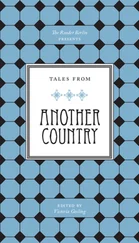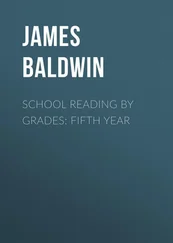“How do we know that?” Cass asked.
“Oh, honey, you know what he’s been like these last few months. We hardly ever saw him but everybody knew.”
Knew what? she wanted to ask. Just what in hell did everybody know? But she dried her eyes and stood up.
“Vivaldo tried like hell to stop what he was doing to Leona. And if he could have stopped him from doing that —well, then, maybe he could have stopped this, too.”
That’s true, she thought, and looked at Richard, who, under stress, could always surprise her into taking his measure again.
“I was very fond of him,” she said, helplessly. “There was something very sweet in him.”
He looked at her with a faint smile. “Well, I guess you’re just naturally nicer than I am. I didn’t think that. I thought he was a pretty self-centered character, if you want the truth.”
“Oh, well,” she said, “self-centered—! We don’t know a soul who isn’t.”
“You’re not,” he said. “You think of other people and you try to treat them right. You spend your life trying to take care of the children — and me—”
“Oh, but you are my life — you and the children. What would I do, what would I be, without you? I’m just as self-centered as anybody else. Can’t you see that?”
He grinned and rubbed his hand roughly over her head. “No. And I’m not going to argue about it any more.” But, after a moment, he persisted. “I didn’t love Rufus, not the way you did, the way all of you did. I couldn’t help feeling, anyway, that one of the reasons all of you made such a kind of— fuss —over him was partly just because he was colored. Which is a hell of a reason to love anybody. I just had to look on him as another guy. And I couldn’t forgive him for what he did to Leona. You once said you couldn’t, either.”
“I’ve had to think about it since then. I’ve thought about it since then.”
“And what have you thought? You find a way to justify it?”
“No. I wasn’t trying to justify it. It can’t be justified. But now I think — oh, I just don’t know enough to be able to judge him. He must — he must have been in great pain. He must have loved her.” She turned to him, searching his face. “I’m sure he loved her.”
“Some love,” he said.
“Richard,” she said, “you and I have hurt each other — many times. Sometimes we didn’t mean to and sometimes we did. And wasn’t it because — just because —we loved — love each other?”
He looked at her oddly, head to one side. “Cass,” he said, “how can you compare it? We’ve never tried to destroy each other — have we?”
They watched each other. She said nothing.
“I’ve never tried to destroy you. Have you ever tried to destroy me?”
She thought of his face as it had been when they met; and watched it now. She thought of all they had discovered together and meant to each other, and of how many small lies had gone into the making of their one, particular truth: this love, which bound them to one another. She had said No, many times, to many things, when she knew she might have said Yes, because of Richard; believed many things, because of Richard, which she was not sure she really believed. He had been absolutely necessary to her — or so she had believed; it came to the same thing — and so she had attached herself to him and her life had taken shape around him. She did not regret this for herself. I want him, something in her had said, years ago. And she had bound him to her; he had been her salvation; and here he was. She did not regret it for herself and yet she began to wonder if there were not something in it to be regretted, something she had done to Richard which Richard did not see.
“No,” she said, faintly. And then, irrepressibly, “But I wouldn’t have had to try.”
“What do you mean by that?”
“I mean”—he was watching her; she sat down again, playing with the glass of whiskey—“a man meets a woman. And he needs her. But she uses this need against him, she uses it to undermine him. And it’s easy. Women don’t see men the way men want to be seen. They see all the tender places, all the places where blood could flow.” She finished the whiskey. “Do you see what I mean?”
“No,” he said, frankly, “I don’t. I don’t believe all this female intuition shit. It’s something women have dreamed up.”
“You can say that — and in such a tone!” She mimicked him: “Something women have dreamed up. But I can’t say that — what men have ‘dreamed up’ is all there is, the world they’ve dreamed up is the world.” He laughed. She subsided. “Well. It’s true.”
“What a funny girl you are,” he said. “You’ve got a bad case of penis envy.”
“So do most men,” she said, sharply, and he laughed. “All I meant, anyway,” she said, soberly, “is that I had to try to fit myself around you and not try to make you fit around me. That’s all. And it hasn’t been easy.”
“No.”
“No. Because I love you.”
“Ah!” he said, and laughed aloud, “you are a funny girl. I love you, too, you know that.”
“I hope you do,” she said.
“You know me so well and you don’t know that? What happened to all that intuition, all that— specialized —point of view?”
“Beyond a certain point,” she said, with a sullen smile, “it doesn’t seem to work so well.”
He pulled her up from the table and put both arms around her, bending his cheek to her hair. “What point is that, my darling?”
Everything, his breath in her hair, his arms, his chest, his odor — was familiar, confining, unutterably dear. She turned her head slightly to look out of the kitchen window. “Love,” she said, and watched the cold sunlight. She thought of the cold river and of the dead black boy, their friend. She closed her eyes. “Love,” she said, again, “love.”
Richard stayed with the children Saturday, while Cass and Vivaldo went uptown to Rufus’ funeral. She did not want to go but she could not refuse Vivaldo, who knew that he had to be there but dreaded being there alone.
It was a morning funeral, and Rufus was to be driven to the graveyard immediately afterward. Early on that cold, dry Saturday, Vivaldo arrived, emphatically in black and white: white shirt, black tie, black suit, black shoes, black coat; and black hair, eyes, and eyebrows, and a dead-white, bone-dry face. She was struck by his panic and sorrow; without a word, she put on her dark coat and put her hand in his; and they rode down in the elevator in silence. She watched him in the elevator mirror. Sorrow became him. He was reduced to his beauty and elegance — as bones, after a long illness, come forward through the flesh.
They got into a taxi and started uptown. Vivaldo sat beside her, his hands on his knees, staring straight ahead. She watched the streets. Traffic was heavy, but rolling; the cab kept swerving and jerking, slowing down and speeding up but managing not to stop. Then, at Thirty-fourth Street, the red light brought it to a halt. They were surrounded by a violence of cars, great trucks, green buses lumbering across town, and boys, dark boys, pushing wooden wagons full of clothes. The people on the sidewalks overflowed into the streets. Women in heavy coats moved heavily, carrying large packages and enormous handbags — for Thanksgiving was over but signs proclaimed the dwindling number of shopping days to Christmas. Men, relatively unburdened, pursuing the money which Christmas cost, hurried around and past the women; boys in ducktail haircuts swung over the cold black asphalt as though it were a dance floor. Outside the window, as close to her as Vivaldo, one of the colored boys stopped his wagon, lit a cigarette, and laughed. The taxi could not move and the driver began cursing. Cass lit a cigarette and handed it to Vivaldo. She lit another for herself. Then, abruptly, the taxi jerked forward.
Читать дальше












